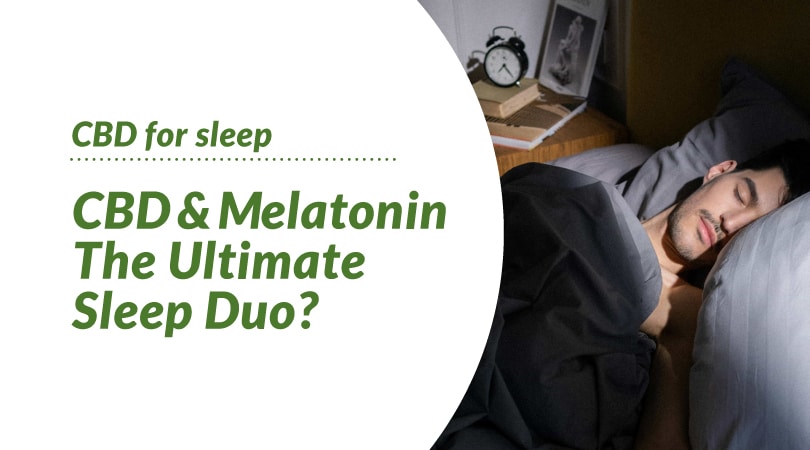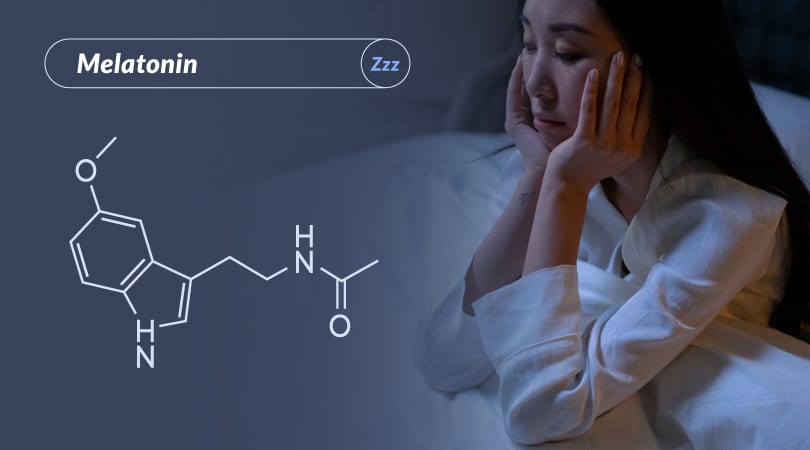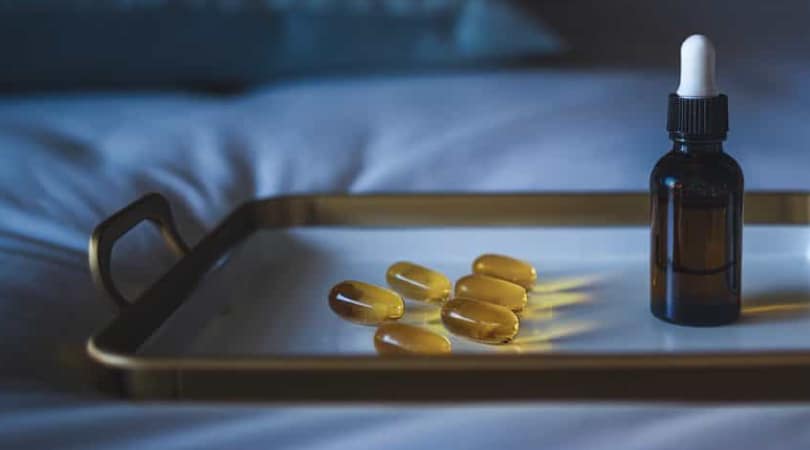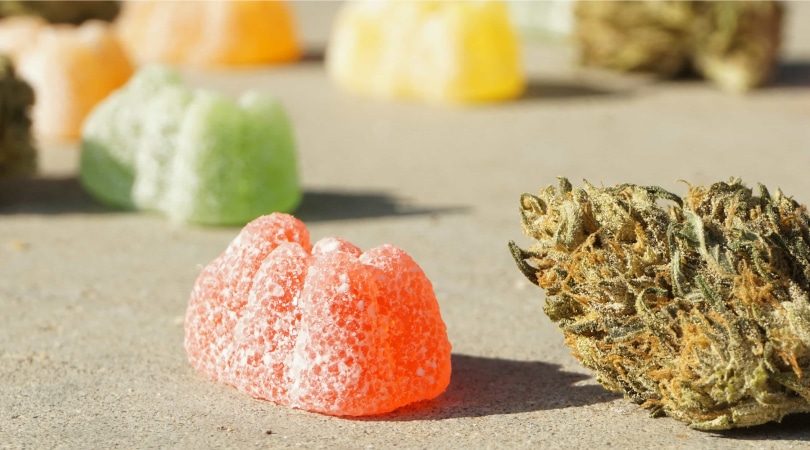
CBD and Melatonin: The Ultimate Sleep Duo?
If you suffer from sleep problems, you’re not alone. Many people struggle with insomnia or restless nights due to stress, health issues, or even irregular schedules.
Luckily, there are a number of things you can try to achieve a good night’s sleep. CBD and melatonin have become popular for their potential therapeutic properties, especially for helping alleviate sleep issues.
Let’s dive into how these substances work, their potential benefits, and what science says about combining them for optimal sleep health.
Common Causes of Sleep Problems
- Stress and Anxiety: Overthinking and worry can make it hard to relax and fall asleep.
- Irregular Sleep Schedules: Frequent changes in work shifts or travel across time zones disrupt the body’s internal clock.
- Lifestyle Factors: Consuming caffeine late in the day, heavy meals before bed, or too much screen time can interfere with sleep.
- Health Conditions: Issues like respiratory disorders, chronic pain, or metabolic problems often contribute to poor sleep quality.
Melatonin and Sleep
What is Melatonin?
Melatonin, known as the “sleep hormone” plays a key part in regulating the sleep-wake cycle.
It is a hormone produced by the pineal gland in the brain, primarily at night. Its role is to let your body know that it’s time to wind down and prepare for sleep.
How Is Melatonin Naturally Created Within the Body?
The production of melatonin is closely linked to exposure to light. When it gets dark, your brain ramps up melatonin production.
Conversely, bright lights, especially blue light from screens, can suppress its release. This explains why sleep specialists suggest avoiding using your phone and other devices before sleeping.
How are Melatonin Supplements Made?
Melatonin supplements are typically synthesized in a lab to mimic the naturally occurring hormone.
These supplements are available in various forms, such as pills, gummies, and liquid drops, and are commonly used to help with jet lag or shift work-related sleep disruptions.
Melatonin and Sleep Research
A systematic review evaluated 23 studies examining melatonin’s effects on insomnia patients. Researchers suggested that melatonin significantly improved sleep quality, as measured by the Pittsburgh Sleep Quality Index (PSQI, a self-report questionnaire that assesses sleep quality over a 1-month time interval).
For individuals with metabolic or respiratory disorders, the potential therapeutic benefits were even more pronounced.

How Can Melatonin Help with Sleep?
Melatonin works by reinforcing your body’s natural sleep-wake rhythm. You are essentially giving your body a signal to shift into a more relaxed state by supplementing with melatonin.
Supplementation can make falling asleep easier and improve overall sleep quality for those with disrupted schedules or lower natural melatonin production.
CBD and Sleep
What is CBD?
CBD, or cannabidiol, is a non-intoxicating compound derived from the hemp plant. It doesn’t cause a “high” but has been associated with numerous therapeutic benefits, including promoting relaxation and potentially improving sleep.
How is CBD Made?
CBD is extracted from hemp plants through processes like Supercritical CO2 extraction. It’s then formulated into oils, salves, topicals, or other products designed for easy consumption.
CBD and Sleep Research
A review of 34 studies highlighted CBD’s potential to improve insomnia symptoms in various participants. Many studies tested CBD predominantly, while others used a combination of CBD and THC. The studies suggested significant improvements in sleep, particularly in those using products with balanced ratios of CBD to THC.
Another clinical study examined the impact of 50 mg daily CBD for eight weeks on sleep quality and immune function in healthy, young adults. Participants taking CBD reported an improvement in sleep quality.
Additionally, the study suggested enhanced immune function, specifically for Natural Killer (NK) cell activity (cells in charge of identifying and destroying abnormal cells, such as virus-infected cells), suggesting broader health benefits beyond sleep.
How Can CBD Help with Sleep?
CBD might promote relaxation by interacting with the body’s endocannabinoid system, which helps regulate processes like mood, stress, and sleep.
Its calming effects may make it easier to fall and stay asleep. In addition, CBD’s potential to alleviate anxiety and pain could contribute to better sleep quality for people dealing with these issues.
The Power of Combining CBD and Melatonin
Can you take CBD with melatonin? The answer is yes. Melatonin helps regulate the sleep-wake cycle, while CBD can potentially promote relaxation and address stress or discomfort that may interfere with sleep.
When it comes to CBD vs. melatonin, it’s not about choosing one over the other but understanding how they work together.
Together, CBD and melatonin create a powerful synergy: melatonin can help you fall asleep faster, while CBD can potentially help you stay relaxed and enjoy deeper, more restorative sleep.

CBD vs Melatonin: If You Have to Choose
Choosing between CBD and melatonin depends on your sleep challenges and personal needs. Both are effective for different reasons and understanding their strengths and limitations can help you decide which is right for you.
Pros of Melatonin
Supports Natural Sleep Cycles: Since melatonin is a hormone your body naturally produces, it helps regulate the sleep-wake cycle.
Quick Results: Unlike some sleep aids that may take weeks to show results, melatonin works relatively quickly—often within 60–90 minutes of taking it—making it ideal for short-term sleep issues.
Easy and Accessible Dosing: Melatonin supplements are widely available in various forms, such as pills, and gummies with clearly labeled dosages. This makes it easy for users to find the right dose and stick to it.
Cons of Melatonin
Limited Long-Term Use: While melatonin is effective for short-term sleep issues, relying on it long-term can disrupt the body’s natural melatonin production. Over time, the body may become less efficient at producing melatonin naturally.
Side Effects: Some people report side effects such as grogginess, vivid dreams, or mild headaches after taking melatonin.
Specific Application: Melatonin primarily helps with sleep timing issues and is less effective for addressing broader sleep challenges, such as pain or anxiety that interfere with sleep.
Pros of CBD
Promotes Relaxation: CBD interacts with the body’s endocannabinoid system and can potentially promote relaxation, reduce stress, and alleviate anxiety, which are common obstacles to restful sleep.
Versatility
Beyond sleep, CBD is known for its potential therapeutic benefits in managing pain, inflammation, and general well-being, making it a more holistic option for those with complex sleep problems.
Customizable Options
CBD products come in a variety of forms—oils, topicals, salves—allowing you to find the format that works best for you. Dosages can also be adjusted to your needs.
How to Take CBD and Melatonin Together
Melatonin for Sleep
- Melatonin Products: Melatonin is commonly available in pills, gummies, sprays, and liquid drops. Gummies are especially popular for their convenience and taste.
- Dosage: The standard dosage for sleep is 1–3 mg, but some people may require up to 5 mg. Always start with the lowest effective dose to learn what is the best dose for you.
- Timing: Take melatonin 60–90 minutes before your sleep time to allow it to take effect.
CBD for Sleep
- CBD Products: Full-spectrum CBD oil is the most recommended form because it contains additional cannabinoids and terpenes that enhance CBD’s effects through the entourage effect. This means the compounds work together to provide stronger effects.
- Dosage: Start with a low dose, such as 15–30 mg, and gradually increase it based on your tolerance and needs. For severe sleep issues, higher doses (50–80 mg) may be beneficial.
- Timing: Take CBD 30–60 minutes before bed. If using oil, hold the drops under your tongue for 30–60 seconds before swallowing for faster absorption.
If you’re using separate CBD and melatonin products, follow the specific dosing and timing instructions for each. While they may need to be taken at different times, their effects will eventually combine to promote better sleep.

Advantages of Using CBD and Melatonin Together
- Enhanced Sleep Support: Combining CBD and melatonin can potentially address both physiological and psychological aspects of sleep. Together, they can potentially improve both the quality and quantity of your sleep.
- Improved Sleep Quality: Anecdotal evidence suggests users often fall asleep faster and experience fewer interruptions during the night.
- Flexible Routine: The dosage and timing can be tailored to fit your needs, allowing for a highly personalized sleep routine.
FAQs
Can a diabetic take CBD and melatonin together?
While no specific studies have explored the combined use of CBD and melatonin for diabetic patients, preliminary research suggests both may be safe.
Melatonin’s role in diabetes is less clear, with some studies suggesting benefits for glucose regulation. Diabetic patients should consult their doctor before trying this combination.
Is the CBD and melatonin mix safe?
Both CBD and melatonin are generally safe for most people when used as directed. However, individuals taking other medications or with pre-existing conditions should consult a healthcare professional before combining these supplements.
Can you take melatonin long-term?
Melatonin is generally intended for short-term use. Prolonged use without medical guidance could interfere with your body’s ability to produce melatonin naturally.
How long does it take for CBD and melatonin to kick in?
Melatonin typically takes 60–90 minutes to take effect, while CBD can take 30–60 minutes, depending on the form and dosage.
How long do the effects last?
The effects of both supplements usually last 6 hours, covering a full sleep cycle.
Does CBD interact with other supplements or medications?
CBD may interact with medications like blood thinners, antidepressants, and sedatives. Always check with your doctor if you’re on medication.
Does melatonin interact with other supplements or medications?
Melatonin can interact with sedatives, increasing sleepiness. Also, it is suggested that it could interact with medication for blood pressure.
What are other tips for good sleep?
- Maintain a Sleep Schedule: Go to bed and wake up at the same time daily, even on weekends.
- Limit Stimulants: Avoid caffeine, nicotine, and heavy meals at least 4 hours before bedtime.
- Create a Sleep-Friendly Environment: Keep your bedroom dark, quiet, and cool.
- Wind Down: Develop a relaxing pre-sleep routine, such as reading or meditating.
Conclusion
If sleep problems are keeping you from feeling your best, combining CBD and melatonin might be the solution you’ve been searching for. These two supplements work together to help you relax, fall asleep faster, and enjoy restorative rest.
With the potential to address both physical and emotional barriers to sleep, they offer a holistic approach to improving your nightly routine.
Ready to take control of your sleep? Discover our full-spectrum CBD oil at Vitality, and start your wellness journey.
Visit our website today and explore our range of high-quality CBD products. Your path to restful nights starts here!
References
Fatemeh G, Sajjad M, Niloufar R, Neda S, Leila S, Khadijeh M. Effect of melatonin supplementation on sleep quality: a systematic review and meta-analysis of randomized controlled trials. J Neurol. 2022 Jan;269(1):205-216. doi: 10.1007/s00415-020-10381-w. Epub 2021 Jan 8. PMID: 33417003.
Farid A, Moussa P, Youssef M, Haytham M, Shamy A, Safwat G. Melatonin relieves diabetic complications and regenerates pancreatic beta cells by the reduction in NF-kB expression in streptozotocin induced diabetic rats. Saudi J Biol Sci. 2022 Jul;29(7):103313. doi: 10.1016/j.sjbs.2022.103313. Epub 2022 May 22. PMID: 35707823; PMCID: PMC9189213.
Kisiolek JN, Flores VA, Ramani A, Butler B, Haughian JM, Stewart LK. Eight Weeks of Daily Cannabidiol Supplementation Improves Sleep Quality and Immune Cell Cytotoxicity. Nutrients. 2023 Sep 27;15(19):4173. doi: 10.3390/nu15194173. PMID: 37836465; PMCID: PMC10574483.
Mattes RG, Espinosa ML, Oh SS, Anatrella EM, Urteaga EM. Cannabidiol (CBD) Use in Type 2 Diabetes: A Case Report. Diabetes Spectr. 2021 May;34(2):198-201. doi: 10.2337/ds20-0023. Epub 2021 Dec 23. PMID: 34149261; PMCID: PMC8178711.
Ranum RM, Whipple MO, Croghan I, Bauer B, Toussaint LL, Vincent A. Use of Cannabidiol in the Management of Insomnia: A Systematic Review. Cannabis Cannabinoid Res. 2023 Apr;8(2):213-229. doi: 10.1089/can.2022.0122. Epub 2022 Sep 23. PMID: 36149724.
